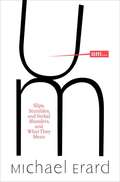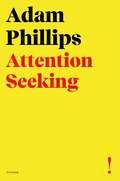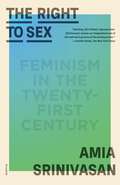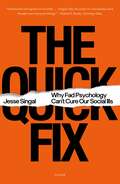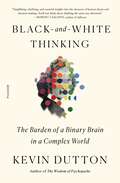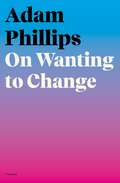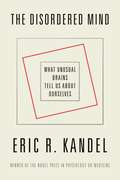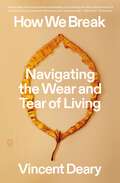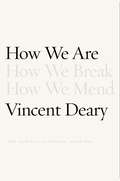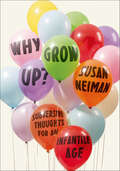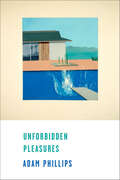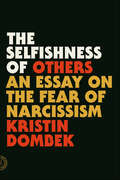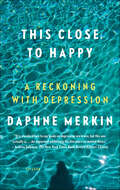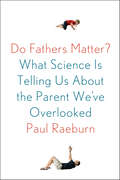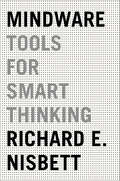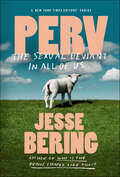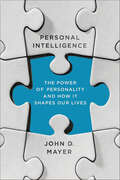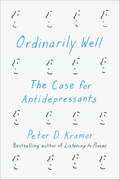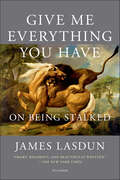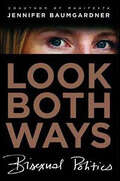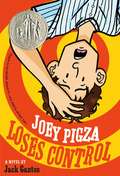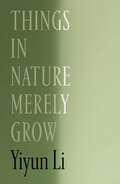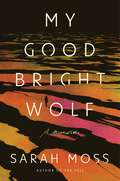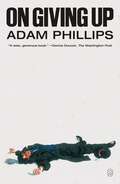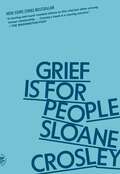- Table View
- List View
Um...Slips, Stumbles, and Verbal Blunders, and What They Mean
by Michael ErardJournalist and language expert Erard argues that the secrets of human speech are present in our verbal blunders as he studies and interprets speech errors--hilarious bloopers, Spoonerisms, and malapropisms.
Attention Seeking
by Adam PhillipsAttention Seeking is a short, fascinating introduction to the concept of attention from Britain’s leading psychoanalyst, author of Missing Out and On Kindness.Everything depends on what, if anything, we find interesting: on what we are encouraged and educated to find interesting, and what we find ourselves being interested in despite ourselves. There is our official curiosity and our unofficial curiosity (and psychoanalysis is a story about the relationship between the two).Based on three connected lectures by Adam Phillips, this compact book is a lucid and memorable introduction to the concept of our attention, spanning from interest to obsession, private desire to corporate commodity. What is attention, and why do we seek it? How does our culture moralize attention as a force in need of control? Phillips is one of our brightest and most unusual thinkers, uniquely capable of bringing our deepest impulses and instincts to light.
The Right to Sex: Feminism in the Twenty-First Century
by Amia Srinivasan“Laser-cut writing and a stunning intellect. If only every writer made this much beautiful sense.”—Lisa Taddeo, author of Three Women“Amia Srinivasan is an unparalleled and extraordinary writer—no one X-rays an argument, a desire, a contradiction, a defense mechanism quite like her. In stripping the new politics of sex and power down to its fundamental and sometimes clashing principles, The Right to Sex is a bracing revivification of a crucial lineage in feminist writing: Srinivasan is daring, compassionate, and in relentless search of a new frame.”—Jia Tolentino, author of Trick Mirror: Reflections on Self DelusionThrilling, sharp, and deeply humane, philosopher Amia Srinivasan's The Right to Sex: Feminism in the Twenty-First Century upends the way we discuss—or avoid discussing—the problems and politics of sex.How should we think about sex? It is a thing we have and also a thing we do; a supposedly private act laden with public meaning; a personal preference shaped by outside forces; a place where pleasure and ethics can pull wildly apart.How should we talk about sex? Since #MeToo many have fixed on consent as the key framework for achieving sexual justice. Yet consent is a blunt tool. To grasp sex in all its complexity—its deep ambivalences, its relationship to gender, class, race and power—we need to move beyond yes and no, wanted and unwanted.We do not know the future of sex—but perhaps we could imagine it. Amia Srinivasan’s stunning debut helps us do just that. She traces the meaning of sex in our world, animated by the hope of a different world. She reaches back into an older feminist tradition that was unafraid to think of sex as a political phenomenon. She discusses a range of fraught relationships—between discrimination and preference, pornography and freedom, rape and racial injustice, punishment and accountability, students and teachers, pleasure and power, capitalism and liberation.The Right to Sex: Feminism in the Twenty-First Century is a provocation and a promise, transforming many of our most urgent political debates and asking what it might mean to be free.
The Quick Fix: Why Fad Psychology Can't Cure Our Social Ills
by Jesse SingalAn investigative journalist exposes the many holes in today’s bestselling behavioral science, and argues that the trendy, TED-Talk-friendly psychological interventions that are so in vogue at the moment will never be enough to truly address social injustice and inequality.With their viral TED talks, bestselling books, and counter-intuitive remedies for complicated problems, psychologists and other social scientists have become the reigning thinkers of our time. Grit and “power posing” promised to help overcome entrenched inequalities in schools and the workplace; the Army spent hundreds of millions of dollars on a positive psychology intervention geared at preventing PTSD in its combat soldiers; and the implicit association test swept the nation on the strength of the claim that it can reveal unconscious biases and reduce racism in police departments and human resources departments. But what if much of the science underlying these blockbuster ideas is dubious or fallacious? What if Americans’ longstanding preference for simplistic self-help platitudes is exerting a pernicious influence on the way behavioral science is communicated and even funded, leading respected academics and the media astray? In The Quick Fix, Jesse Singal examines the most influential ideas of recent decades and the shaky science that supports them. He begins with the California legislator who introduced self-esteem into classrooms around the country in the 1980s and the Princeton political scientist who warned of an epidemic of youthful “superpredators” in the 1990s. In both cases, a much-touted idea had little basis in reality, but had a massive impact. Turning toward the explosive popularity of 21st-century social psychology, Singal examines the misleading appeal of entertaining lab results and critiques the idea that subtle unconscious cues shape our behavior. As he shows, today’s popular behavioral science emphasizes repairing, improving, and optimizing individuals rather than truly understanding and confronting the larger structural forces that drive social ills. Like Anand Giridharadas’s Winners Take All, The Quick Fix is a fresh and powerful indictment of the thought leaders and influencers who cut corners as they sell the public half-baked solutions to problems that deserve more serious treatment.
Black-and-White Thinking: The Burden of a Binary Brain in a Complex World
by Kevin DuttonA groundbreaking and timely book about how evolutionary biology can explain our black-and-white brains, and a lesson in how we can escape the pitfalls of binary thinking.Several million years ago, natural selection equipped us with binary, black-and-white brains. Though the world was arguably simpler back then, it was in many ways much more dangerous. Not coincidentally, the binary brain was highly adept at detecting risk: the ability to analyze threats and respond to changes in the sensory environment—a drop in temperature, the crack of a branch—was essential to our survival as a species. Since then, the world has evolved—but we, for the most part, haven’t. Confronted with a panoply of shades of gray, our brains have a tendency to “force quit:” to sort the things we see, hear, and experience into manageable but simplistic categories. We stereotype, pigeon-hole, and, above all, draw lines where in reality there are none. In our modern, interconnected world, it might seem like we are ill-equipped to deal with the challenges we face—that living with a binary brain is like trying to navigate a teeming city center with a map that shows only highways. In Black-and-White Thinking, the renowned psychologist Kevin Dutton pulls back the curtains of the mind to reveal a new way of thinking about a problem as old as humanity itself. While our instinct for categorization often leads us astray, encouraging polarization, rigid thinking, and sometimes outright denialism, it is an essential component of the mental machinery we use to make sense of the world. Simply put, unless we perceived our environment as a chessboard, our brains wouldn’t be able to play the game. Using the latest advances in psychology, neuroscience, and evolutionary biology, Dutton shows how we can optimize our tendency to categorize and fine-tune our minds to avoid the pitfalls of too little, and too much, complexity. He reveals the enduring importance of three “super categories”—fight or flight, us versus them, and right or wrong—and argues that they remain essential to not only convincing others to change their minds but to changing the world for the better. Black-and-White Thinking is a scientifically informed wake-up call for an era of increasing extremism and a thought-provoking, uplifting guide to training our gray matter to see that gray really does matter.
On Wanting to Change
by Adam PhillipsFrom the UK’s foremost literary psychoanalyst, a dazzling new book on the universal urge to change our lives.We live in a world in which we are invited to change—to become our best selves through politics, or fitness, or diet, or therapy. We change all the time—growing older and older—and how we think about change changes over time too.We want to think of our lives as progress myths—as narratives of positive personal growth—at the same time as we inevitably age and suffer setbacks.Adam Phillips’s sparkling book On Wanting to Change explores the stories we tell about change, and the changes we actually make—and the fact that they don’t always go, or come, together.
The Disordered Mind: What Unusual Brains Tell Us About Ourselves
by Eric R. KandelEric R. Kandel, the winner of the Nobel Prize in Physiology or Medicine for his foundational research into memory storage in the brain, is one of the pioneers of modern brain science. His work continues to shape our understanding of how learning and memory work and to break down age-old barriers between the sciences and the arts.In his seminal new book, The Disordered Mind, Kandel draws on a lifetime of pathbreaking research and the work of many other leading neuroscientists to take us on an unusual tour of the brain. He confronts one of the most difficult questions we face: How does our mind, our individual sense of self, emerge from the physical matter of the brain? The brain’s 86 billion neurons communicate with one another through very precise connections. But sometimes those connections are disrupted. The brain processes that give rise to our mind can become disordered, resulting in diseases such as autism, depression, schizophrenia, Parkinson’s, addiction, and post-traumatic stress disorder. While these disruptions bring great suffering, they can also reveal the mysteries of how the brain produces our most fundamental experiences and capabilities—the very nature of what it means to be human. Studies of autism illuminate the neurological foundations of our social instincts; research into depression offers important insights on emotions and the integrity of the self; and paradigm-shifting work on addiction has led to a new understanding of the relationship between pleasure and willpower.By studying disruptions to typical brain functioning and exploring their potential treatments, we will deepen our understanding of thought, feeling, behavior, memory, and creativity. Only then can we grapple with the big question of how billions of neurons generate consciousness itself.
How We Break: Navigating the Wear and Tear of Living (How to Live Series #2)
by Vincent DearyDrawing on cutting-edge science and intimate personal stories, an essential and paradigm-shifting book for readers struggling with fatigue, burnout, stress, and trauma—and for all of us who sometimes feel like we have been pushed past our breaking point.In How We Are, the health psychologist and author Vincent Deary explored the process of habit and change in everyday life. In How We Break, a deeply compassionate and illuminating exploration of suffering, he examines what happens when we are pushed to our limit. Deary is a practitioner health psychologist who also works in a fatigue clinic and specializes in interventions that help people cope with whatever life has thrown at them. The big traumas in life, he points out, are relatively rare. Much more common is when too many things go wrong at once, or we are exposed to a prolonged period of difficulty or precarity. When we are subjected to too much turbulence—when the world shrinks to nothing but our daily coping—we become unhappy, worried, hopeless, exhausted. In other words, we break. Breaking, he shows us, is embodied, as our physical and mental distress are linked, and happens when the same systems that enable us to navigate through life become dysregulated. But if we understand how the turbulence and overwhelm of life affects us, then we have a better chance of overcoming the challenges. Drawing on clinical case studies, trailblazing scientific research, intimate personal stories, and illuminating references from philosophy, literature, and film, How We Break offers a consoling and deeply felt new vision of everyday human struggling, and it makes a bold case for the power of rest and recuperation.
How We Are
by Vincent DearyThe first book in a major new trilogy, How to Live: How We Are, How We Break, and How We MendWe live in small worlds. How We Are is an astonishing debut and the first part of the monumental How to Live trilogy, a profound and ambitious work that gets to the heart of what it means to be human: how we are, how we break, and how we mend. In Book One, How We Are, we explore the power of habit and the difficulty of change. As Vincent Deary shows us, we live most of our lives automatically, in small worlds of comfortable routine--what he calls Act One. Conscious change requires deliberate effort, so for the most part we avoid it. But inevitably, from within or without, something comes along to disturb our small worlds--some News from Elsewhere. And with reluctance, we begin the work of adjustment: Act Two. Over decades of psychotherapeutic work, Deary has witnessed the theater of change--how ordinary people get stuck, struggle with new circumstances, and finally transform for the better. He is keenly aware that novelists, poets, philosophers, and theologians have grappled with these experiences for far longer than psychologists. Drawing on his own personal experience and a staggering range of literary, philosophical, and cultural sources, Deary has produced a mesmerizing and universal portrait of the human condition. Part psychologist, part philosopher, part novelist, Deary helps us to see how we can resist being habit machines, and make our acts and our lives more fully our own.
Why Grow Up?: Subversive Thoughts for an Infantile Age
by Susan Neiman“Accessible philosophy doesn’t get much better than this insightful review of what Enlightenment thinkers such as Kant and Rousseau have to offer people today.” —Publishers Weekly (starred review)In Why Grow Up? the philosopher Susan Neiman asks not just why one should grow up but how. In making her case she draws chiefly from the thought of Kant and Rousseau, who articulated very different theories on the proper way to “come of age.” But these thinkers complement each other in seeking a “path between mindlessly accepting everything you’re told and mindlessly rejecting it,” and in learning to live without despair in a world marked by painful realities and uncertainties.Neiman challenges both those who dogmatically privilege innocence and those who see youth as weakness. Her chief opponents are those who equate maturity with cynicism. “In our day it is more common to meet people who are stuck in the mire of adolescence. The world turns out not to reflect the idea and ideals they had for it? So much the worse for ideals.”To move beyond these immature positions, Neiman writes, is not simply to lapse into quiet resignation but to learn to take joy and satisfaction in what can be done and known, and to face rather than feel defeated by our inevitable limits.“[Neiman] comes across as a patient pedagogue rather than an angry scold . . . Why Grow Up? isn’t an exercise in pop-culture polemics or pop-sociological cherry-picking. It’s a case for philosophy of an admirably old-fashioned kind.” —The New York Times Book Review“A spirited defence of the aspiration to maturity.” —The Guardian
Unforbidden Pleasures
by Adam PhillipsMuch has been written of the forbidden pleasures. But what of the "unforbidden" pleasures?Unforbidden Pleasures is the singular new book from Adam Phillips, the author of Missing Out, Going Sane, and On Balance. Here, with his signature insight and erudition, Phillips takes Oscar Wilde as a springboard for a deep dive into the meanings and importance of the unforbidden, from the fall of our "first parents," Adam and Eve, to the work of the great psychoanalytic thinkers. Forbidden pleasures, he argues, are the ones we tend to think about, yet when you look into it, it is probable that we get as much pleasure, if not more, from unforbidden pleasures than from those that are taboo. And we may have underestimated just how restricted our restrictiveness, in thrall to the forbidden and its rules, may make us. An ambitious book that speaks to the precariousness of modern life, Unforbidden Pleasures explores the philosophical, psychological, and social dynamics that govern human desire and shape our everyday reality.
The Selfishness of Others: An Essay on the Fear of Narcissism
by Kristin DombekThey're among us, but they are not like us. They manipulate, lie, cheat, and steal. They are irresistibly charming and accomplished, appearing to live in a radiance beyond what we are capable of. But narcissists are empty. No one knows exactly what everyone else is full of--some kind of a soul, or personhood--but whatever it is, experts agree that narcissists do not have it.So goes the popular understanding of narcissism, or NPD (narcissistic personality disorder). And it's more prevalent than ever, according to recent articles in The New York Times, The Atlantic, and Time. In bestsellers like The Narcissism Epidemic, Narcissists Exposed, and The Narcissist Next Door, pop psychologists have armed the normal with tools to identify and combat the vampiric influence of this rising population, while on websites like narcissismsurvivor.com, thousands of people congregate to swap horror stories about relationships with "narcs."In The Selfishness of Others, the essayist Kristin Dombek provides a clear-sighted account of how a rare clinical diagnosis became a fluid cultural phenomenon, a repository for our deepest fears about love, friendship, and family. She cuts through hysteria in search of the razor-thin line between pathology and common selfishness, writing with robust skepticism toward the prophets of NPD and genuine empathy for those who see themselves as its victims. And finally, she shares her own story in a candid effort to find a path away from the cycle of fear and blame and toward a more forgiving and rewarding life.
This Close to Happy: A Reckoning with Depression
by Daphne Merkin&“A cleareyed, insightful account of how she felt during her nosedives into despair . . . shot through with a self-awareness that helps readers cheer her on.&”—The New York Times A New York Times Book Review Favorite Read of the Year &“Despair is always described as dull,&” writes Daphne Merkin, &“when the truth is that despair has a light all its own, a lunar glow, the color of mottled silver.&” This Close to Happy—Merkin&’s rare, vividly personal account of what it feels like to suffer from clinical depression—captures this strange light. Merkin has been hospitalized three times: first, in grade school, for childhood depression; years later, after her daughter was born, for severe postpartum depression; and later still, after her mother died, for obsessive suicidal thinking. Recounting this series of hospitalizations, as well as her visits to myriad therapists and psychopharmacologists, Merkin portrays the lifelong arc of her affliction, beginning in a childhood largely bereft of love and stretching into the present, where she lives a high-functioning life and her depression is manageable, if not &“cured.&” The opposite of depression, she writes with characteristic insight, is not a state of unimaginable happiness, but a state of relative all-right-ness. In this dark yet vital memoir, Merkin describes not only the harrowing sorrow that she has known all her life, but also her early, redemptive love of reading and gradual emergence as a writer. Written with an acute understanding of the ways in which her condition has evolved as well as affected those around her, This Close to Happy is an utterly candid coming-to-terms with an illness that is still often stigmatized and shrouded in misunderstanding. &“[A] mesmerizing memoir.&” —Booklist (starred review) &“Brings a stunningly perceptive voice to the forefront of the conversation about depression, one that is both reassuring and revelatory.&” —Carol Gilligan, author of In a Different Voice
Do Fathers Matter?: What Science Is Telling Us About the Parent We've Overlooked
by Paul RaeburnFor too long, we've thought of fathers as little more than sources of authority and economic stability in the lives of their children. Yet cutting-edge studies drawing unexpected links between fathers and children are forcing us to reconsider our assumptions and ask new questions: What changes occur in men when they are "expecting"? Do fathers affect their children's language development? What are the risks and rewards of being an older-than-average father at the time the child is born? What happens to a father's hormone levels at every stage of his child's development, and can a child influence the father's health? Just how much do fathers matter? In Do Fathers Matter? the award-winning journalist and father of five Paul Raeburn overturns the many myths and stereotypes of fatherhood as he examines the latest scientific findings on the parent we've often overlooked. Drawing on research from neuroscientists, animal behaviorists, geneticists, and developmental psychologists, among others, Raeburn takes us through the various stages of fatherhood, revealing the profound physiological connections between children and fathers, from conception through adolescence and into adulthood—and the importance of the relationship between mothers and fathers. In the process, he challenges the legacy of Freud and mainstream views of parental attachment, and also explains how we can become better parents ourselves. Ultimately, Raeburn shows how the role of the father is distinctly different from that of the mother, and that embracing fathers' significance in the lives of young people is something we can all benefit from. An engrossing, eye-opening, and deeply personal book that makes a case for a new perspective on the importance of fathers in our lives no matter what our family structure, Do Fathers Matter? will change the way we view fatherhood today.
Mindware: Tools for Smart Thinking
by Richard E. NisbettAn accessible guide to essential tools of reasoning that can help you make better decisions in your daily life.Scientific and philosophical concepts can change the way we solve problems by helping us to think more effectively about our behavior and our world. Surprisingly, despite their utility, many of these tools remain unknown to most of us.In Mindware, the world-renowned psychologist Richard E. Nisbett presents these ideas in clear and accessible detail. Nisbett has made a distinguished career of studying and teaching such powerful problem-solving concepts as the law of large numbers, statistical regression, cost-benefit analysis, sunk costs and opportunity costs, and causation and correlation, probing the best methods for teaching others how to use them effectively in their daily lives. In this groundbreaking book, Nisbett shows us how to frame common problems in such a way that these scientific and statistical principles can be applied to them. The result is an enlightening and practical guide to the most essential tools of reasoning ever developed—tools that can easily be used to make better professional, business, and personal decisions.Praise for Mindware“Compelling . . . With clear explanations of relevant principles from statistics, formal logic, economics, and psychology, Nisbett does indeed assemble a powerful toolkit for examining the validity of claims made by marketers, politicians, and scientists. Just as important, he encourages us to turn these tools inward and test the legitimacy of our own easily swayed opinions and beliefs.” —The Boston Globe“[Mindware] is friendly and practical and aimed squarely at the lay reader. [Nisbett] sees his book as rather like a crash course in making better decisions and learning what scientifically proven theory to apply to which problem, enabling the reader to “perceive the world more accurately and behave more sensibly.”“—The Sunday Times (UK)
Perv: The Sexual Deviant in All of Us
by Jesse Bering"As a sex writer, Jesse Bering is fearless—and peerless." —Dan Savage"You are a sexual deviant. A pervert, through and through." We may not want to admit it, but as the award-winning columnist and psychologist Jesse Bering reveals in Perv, there is a spectrum of perversion along which we all sit. Whether it's voyeurism, exhibitionism, or your run-of-the-mill foot fetish, we all possess a suite of sexual tastes as unique as our fingerprints—and as secret as the rest of the skeletons we've hidden in our closets.Combining cutting-edge studies and critiques of landmark research and conclusions drawn by Sigmund Freud, Alfred Kinsey, and the DSM-5, Bering pulls the curtain back on paraphilias, arguing that sexual deviance is commonplace. He explores the countless fetishists of the world, including people who wear a respectable suit during the day and handcuff a willing sexual partner at night. But he also takes us into the lives of "erotic outliers," such as a woman who falls madly in love with the Eiffel Tower; a pair of deeply affectionate identical twins; those with a particular penchant for statues; and others who are enamored of crevices not found on the human body. Moving from science to politics, psychology, history, and his own reflections on growing up gay in America, Bering confronts hypocrisy, prejudice, and harm as they relate to sexuality on a global scale. Humanizing so-called deviants while at the same time asking serious questions about the differences between thought and action, he presents us with a challenge: to understand that our best hope of solving some of the most troubling problems of our age hinges entirely on the amoral study of sex.As kinky as it is compassionate, illuminating, and engrossing, Perv is an irresistible and deeply personal book. "I can't promise you an orgasm at the end of our adventure," Bering writes, "but I can promise you a better understanding of why you get the ones you do."
Personal Intelligence: The Power of Personality and How It Shapes Our Lives
by John D. MayerJohn D. Mayer, the renowned psychologist who co-developed the groundbreaking theory of emotional intelligence, now draws on decades of cognitive psychology research to introduce another paradigm-shifting idea: that in order to become our best selves, we use an even broader intelligence—which he calls personal intelligence—to understand our own personality and the personalities of the people around us. In Personal Intelligence, Mayer explains that we are naturally curious about the motivations and inner worlds of the people we interact with every day. Some of us are talented at perceiving what makes our friends, family, and coworkers tick. Some of us are less so. Mayer reveals why, and shows how the most gifted "readers" among us have developed "high personal intelligence." Mayer's theory of personal intelligence brings together a diverse set of findings—previously regarded as unrelated—that show how much variety there is in our ability to read other people's faces; to accurately weigh the choices we are presented with in relationships, work, and family life; and to judge whether our personal life goals conflict or go together well. He persuasively argues that our capacity to problem-solve in these varied areas forms a unitary skill. Illustrating his points with examples drawn from the lives of successful college athletes, police detectives, and musicians, Mayer shows how people who are high in personal intelligence (open to their inner experiences, inquisitive about people, and willing to change themselves) are able to anticipate their own desires and actions, predict the behavior of others, and—using such knowledge—motivate themselves over the long term and make better life decisions. And in outlining the many ways we can benefit from nurturing these skills, Mayer puts forward an essential message about selfhood, sociability, and contentment. Personal Intelligence is an indispensable book for anyone who wants to better comprehend how we make sense of our world.
Ordinarily Well: The Case for Antidepressants
by Peter D. KramerDo antidepressants work, or are they glorified dummy pills? How can we tell?In Ordinarily Well, the celebrated psychiatrist and author Peter D. Kramer examines the growing controversy about the popular medications. A practicing doctor who trained as a psychotherapist and worked with pioneers in psychopharmacology, Kramer combines moving accounts of his patients’ dilemmas with an eye-opening history of drug research to cast antidepressants in a new light.Kramer homes in on the moment of clinical decision making: Prescribe or not? What evidence should doctors bring to bear? Using the wide range of reference that readers have come to expect in his books, he traces and critiques the growth of skepticism toward antidepressants. He examines industry-sponsored research, highlighting its shortcomings. He unpacks the “inside baseball” of psychiatry—statistics—and shows how findings can be skewed toward desired conclusions.Kramer never loses sight of patients. He writes with empathy about his clinical encounters over decades as he weighed treatments, analyzed trial results, and observed medications’ influence on his patients’ symptoms, behavior, careers, families, and quality of life. He updates his prior writing about the nature of depression as a destructive illness and the effect of antidepressants on traits like low self-worth. Crucially, he shows how antidepressants act in practice: less often as miracle cures than as useful, and welcome, tools for helping troubled people achieve an underrated goal—becoming ordinarily well.
Give Me Everything You Have: On Being Stalked
by James LasdunA true story of obsessive love turning to obsessive hate in the crucible of the digital age.Give Me Everything You Have chronicles author James Lasdun's strange and harrowing ordeal at the hands of a former student, a self-styled "verbal terrorist," who began trying, in her words, to "ruin him." Hate mail, online postings, and public accusations of plagiarism and sexual misconduct were her weapons of choice and, as with more conventional terrorist weapons, proved remarkably difficult to combat.James Lasdun's account, while terrifying, is told with compassion and humor, and brilliantly succeeds in turning a highly personal story into a profound meditation on subjects as varied as madness, race, Middle East politics, and the meaning of honor and reputation in the Internet age.
Look Both Ways: Bisexual Politics
by Jennifer BaumgardnerFor the acclaimed author and activist Jennifer Baumgardner, bisexuality has always been more than the "sexual non-preference of the '90s." In Look Both Ways, Baumgardner takes a close look at the growing visibility of gay and bisexual characters, performers, and issues on the national cultural stage. Despite the prevalence of bisexuality among Generation X and Y women, she finds that it continues to be marginalized by both gay and straight cultures, and dismissed either as a phase or a cop-out. With intimacy and humor, Baumgardner discusses her own experience as a bisexual, and the struggle she's undergone to reconcile the privilege she's garnered as a woman who is perceived as straight and the empowerment and satisfaction she's derived from her relationships with women.Part memoir, part pop-culture study, Look Both Ways connects the prominent dots of a bisexual community (Alix Kates Shulman, Ani DiFranco, Rebecca Walker, and, of course, Anne Heche) that Baumgardner argues have bridged feminist aims with those of the gay rights movement. Look Both Ways is a compelling and current study in bisexual lives lived secretly and openly, and an exploration of the lessons learned by writers, artists, and activists who have refused the either/or paradigm defended by both gay and straight communities.
Joey Pigza Loses Control: Grades 4-6 (Joey Pigza #2)
by Jack GantosThe sequel to Joey Pigza Swallowed the Key, a National Book Award Finalist.When Joey Pigza meets his dad for the first time in years, he meets a grown-up version of his old out-of-control self. Carter Pigza is as wired as Joey used to be -- before his stint in special ed, and before he got his new meds. Joey's mom reluctantly agrees that he can stay with his dad for a summer visit, which sends Joey racing with sky-high hopes that he and Carter can finally get to know each other. But as the weeks whirl by, Carter has bigger plans in mind. He decides that just as he has pulled himself up by his own bootstraps, Joey can do the same and become as normal as any kid, without the help of a doctor's prescription. Carter believes Joey can do it and Joey wants to believe him more than anything in the world.Here is the continuation of the acclaimed Joey Pigza story, affirming not only that Joey Pigza is a true original but that it runs in the family.Joey Pigza Loses Control is a 2000 New York Times Book Review Notable Children's Book of the Year and a 2001 Newbery Honor Book.
Things in Nature Merely Grow
by Yiyun LiYiyun Li’s remarkable, defiant work of radical acceptance as she considers the loss of her son James.“There is no good way to say this,” Yiyun Li writes at the beginning of this book.“There is no good way to state these facts, which must be acknowledged. My husband and I had two children and lost them both: Vincent in 2017, at sixteen, James in 2024, at nineteen. Both chose suicide, and both died not far from home.”There is no good way to say this—because words fall short. It takes only an instant for death to become fact, “a single point in a timeline.” Living now on this single point, Li turns to thinking and reasoning and searching for words that might hold a place for James. Li does what she can: “doing the things that work,” including not just writing but gardening, reading Camus and Wittgenstein, learning the piano, and living thinkingly alongside death.This is a book for James, but it is not a book about grieving or mourning. As Li writes, “The verb that does not die is to be. Vincent was and is and will always be Vincent. James was and is and will always be James. We were and are and will always be their parents. There is no now and then, now and later, only, now and now and now and now.” Things in Nature Merely Grow is a testament to Li’s indomitable spirit.
My Good Bright Wolf: A Memoir
by Sarah MossA New York Magazine Most-Anticipated Book of the FallFrom the acclaimed author of Ghost Wall, Summerwater, and The Fell, Sarah Moss’s My Good Bright Wolf is an unflinching memoir about childhood, food, books, and our ability to see, become, and protect ourselves.A girl must watch her figure but never be vain. She must be intelligent but never a know-it-all. She must be ambitious, if she is clever, but not in a way that shows. She must cook and sew and make do and mend. She must know (but never say) that these skills are, in some fundamental way, flawed and frivolous—feminine. Girls must stay small, even as they grow. Women must show restraint. And yet. In books, in the landscape of imagination, a girl can run free.Here, with My Good Bright Wolf, Sarah Moss takes on these rules, these lessons from the fables of girlhood, and uses them to fearlessly investigate the nature of memory, the lure of self-control, the impact of privilege, scarcity, parents, love. Through narratives of women and food, second-wave feminism and postwar puritanism, and her own challenges with a health care system that discounts the experiences of those it ought to serve, Moss seeks truth in the stories we tell ourselves and others. Harm can become power. Attention can become care. A body and a mind, though working hard together, can be at odds.And yet. In books, in the landscape of imagination, a girl can run free. Beautiful and sharp, moving and unapologetic, erudite and very funny, My Good Bright Wolf is a memoir that breaks the rules.
On Giving Up
by Adam PhillipsOne of The New York Times Critics' Picks of the YearFrom acclaimed psychoanalyst Adam Phillips, a meditation on what we must give up to feel more alive.To give up or not to give up?The question can feel inescapable but the answer is never simple.Giving up our supposed vices is one thing; giving up on life itself is quite another. One form of self-sacrifice feels positive, something to admire and aspire to, while the other is profoundly unsettling, if not actively undesirable.There are always, it turns out, both good and bad sacrifices, but it is not always clear beforehand which is which. We give something up because we believe we can no longer go on as we are. In this sense, giving up is a critical moment—an attempt to make a different future.In On Giving Up, the acclaimed psychoanalyst Adam Phillips illuminates both the gaps and the connections between the many ways of giving up and helps us to address the central question: What must we give up in order to feel more alive?
Grief Is for People
by Sloane CrosleyNamed a Best Book of the Year by Vogue, TIME, The Washington Post, The Boston Globe, Esquire, NPR, Elle, Library Journal, LitHub, Oprah Daily, Publishers Weekly, Chicago Public Library, Kirkus, Bookpage, The Independent, and New StatesmanDisarmingly witty and poignant, Sloane Crosley’s memoir explores multiple kinds of loss following the death of her closest friend.How do we live without the ones we love? After the pain and confusion of losing her closest friend to suicide, Sloane Crosley looks for answers in philosophy and art, hoping for a framework more useful than the unavoidable stages of grief.For most of her adult life, Sloane and Russell worked together and played together as they navigated the corridors of office life, the literary world, and the dramatic cultural shifts in New York City. One day, Sloane’s apartment is broken into. Along with her most prized possessions, the thief makes off with her sense of security, leaving a mystery in its place.When Russell dies exactly one month later, his death propels Sloane on a wild quest to right the unrightable, to explore what constitutes family and possession as the city itself faces the staggering toll of the pandemic.Sloane Crosley’s search for truth is frank, wickedly funny, and gilded with resounding empathy. Upending the “grief memoir,” Grief Is for People is a story of the struggle to hold on to the past without being consumed by it. A contemporary elegy, it rises to console and challenge our notions of mourning during these grief-stricken times.
